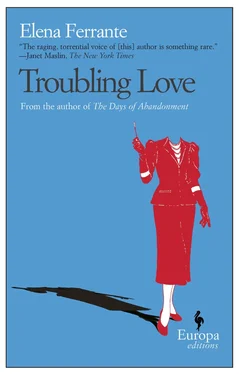“Are you here?” I asked in a hoarse voice, barely controlled.
There was no answer. So I rotated the beam of the flashlight. In one corner a rope had been stretched between the two walls. From it hung plastic hangers holding two shirts, a gray jacket and matching pants carefully folded, a raincoat. I examined the shirts: they had the same label as the one I had found in my mother’s house. So I went on to search the pockets of the jacket, and there I found some change, seven telephone tokens, a second-class ticket from Naples to Rome via Formia, dated May 21st, three used bus tickets, two fruit candies, the receipt for a hotel in Formia, one bill for two single rooms, three receipts for three different bars, and the receipt for a restaurant in Minturno. The train ticket had been issued the same day my mother left Naples. The bill from the hotel, on the other hand, and the restaurant receipt, bore the date of the twenty-second. Caserta and Amalia’s dinner had been lavish: two covers, 6,000 lire; two seafood antipasti, 30,000; two gnocchetti with shrimp, 20,000; two mixed fish grills, 40,000; two vegetables, 8,000; two ice creams, 12,000; two bottles of wine, 30,000.
A lot of food, wine. In general my mother ate very little, and a sip of wine made her head spin. I thought again of the phone calls she had made, of the obscenities she had spoken to me: maybe she wasn’t frightened, maybe she was only happy; maybe she was happy and frightened. Amalia had the unpredictability of a splinter, I couldn’t impose on her the prison of a single adjective. She had traveled with a man who had tormented her at least as much as her husband had and who continued subtly to torment her. With him she had left the line that went between Naples and Rome to slip sideways into a hotel room, a beach at night. She must not have been overly disturbed when Caserta’s fetishism emerged more decisively. I felt her there, in the half-light, as if she were in that sack on the bed, constricted and curious, but not suffering. Certainly she had been pained by the discovery that that man was continuing to pursue her with perverse constancy, as he had done years before, when he had sent his gifts, knowing that he was exposing her to the brutality of her husband. I imagined her disoriented, when she found out that Caserta had gone to my father to talk about her, about the time they spent together. I saw that she was surprised that my father hadn’t killed his presumed rival, as he had always threatened to do, but had listened to him calmly, in order then to spy on her, to beat her, to threaten her, to try to force his presence on her again. She had left in a great hurry, afraid, probably, of being followed by him. On the way, with Signora De Riso, she must have been certain of it. Once on the train she had sighed with relief and perhaps had expected Caserta to show up, to explain, to understand. I thought that she was confused and determined, anchored only to the suitcase in which she had the gifts for me. I roused myself and put back in Caserta’s jacket pockets all those signs of their journey. In the bottom, in the seams, there was sand.
When I returned to my reconnaissance, I gasped. The beam of the flashlight, rotating, had passed by the silhouette of a woman standing against the wall opposite the bed. I brought the light back to the silhouette I had glimpsed. On a hanger attached to the wall was, in perfect order, the suit my mother had worn when she left: jacket and skirt of a material so durable that Amalia for decades had managed to adapt it, with slight modifications, to all the occasions that she considered important. Both garments were arranged on the hanger as if the person who had worn them had stepped out of them just for a moment, promising to return immediately. Under the jacket was an old blue shirt, very familiar to me. Hesitantly I stuck one hand under the collar and found one of Amalia’s ancient bras attached with a diaper pin to the shirt. I felt inside the skirt: there were her mended underpants. On the floor I saw the worn and unfashionable low-heeled shoes, many times resoled, that had belonged to her, and the stockings that lay over them like a veil.
I sat on the edge of the bed. I had to try to keep the suit from detaching itself from the wall. I wanted each of those garments to stay put, motionless, and use up the rest of the energy that Amalia had left there. I let each stitch become unsewed, the blue material become again the uncut fabric, smelling like new, not even touched by Amalia, who, a young girl in a red-and-blue flowered American dress, was still choosing among the bolts of material, in a shop that smelled intensely of fabric. She discussed happily. She was still planning to sew it herself, she was still touching the selvage, she was lifting an edge to calculate the bias. But I wasn’t able to contain her for long. Amalia was already working eagerly. She spread over the material the paper that reproduced the parts of her body. She attached it with pins, piece to piece. She cut it, holding the fabric with the thumb and middle finger of her left hand. She basted. She was sparing with her stitches. She measured, she took out stitches, she restitched. She lined. Oh, I was fascinated by her art of constructing a double. I saw the dress growing like another body, a more accessible body. How many times had I sneaked into the armoire in the bedroom, closed the door, sat in the dark among her clothes, under the redolent skirt of that suit, breathing in her body, clothing myself in it? I was enthralled by her ability to extract a person from the woof and warp of the fabric, a mask that was nourished on warmth and scent, which seemed character, theater, story. Even if she had never let me touch it, that silhouette of hers had certainly been, up to the threshold of my adolescence, generous with suggestions, images, pleasures. The suit was alive.
Caserta, too, must have thought so. On that dress his body had surely lain, when in the course of the last year a senile understanding had grown up between them, which I had failed to value in all its intensity and all its implications. In that dress she had left in a hurry, agitated after my father’s revelations, suspicious, fearful of being watched still. In that dress Amalia’s body had touched Caserta, when he sat down beside her suddenly, in the train. Had they arranged to meet? Now I saw them together, as they met in the compartment, just outside the view of Signora De Riso. Amalia still graceful, slender, with that old-fashioned hair; him tall, lean, neat: a handsome old couple. But perhaps there was no agreement between them: Caserta had followed her onto the train on his own initiative, had sat down beside her, had begun to talk to her, appealing, as it appeared he was able to be. Yet, however things had gone, I doubted that Amalia intended to arrive at my house with him: maybe Caserta had merely offered to keep her company during the journey, maybe on the way she had begun to tell him about our summer vacations, maybe, as had happened to her in recent months, she had begun to lose her sense of things, to forget my father, to forget that the man sitting beside her was obsessed with her, with her person, her body, her way of being, but also with a revenge that was more and more abstract, less and less concrete, pure fantasy among the many fantasies of old age.
Or no: she still had him in mind and was already planning, as she did with clothes, the turn she would give to the last events of her existence. Anyway, the destination had suddenly changed, not by the will of Caserta. Surely it had been Amalia who urged him to get out at Formia. He could have had no interest in returning to the places where we (my father, her, me, my sisters) had gone swimming in the fifties. It was possible, however, that Amalia, convinced that my father, hiding somewhere, had persisted in secretly spying on them, had decided to lead that spy on a journey that might petrify him.
Читать дальше












